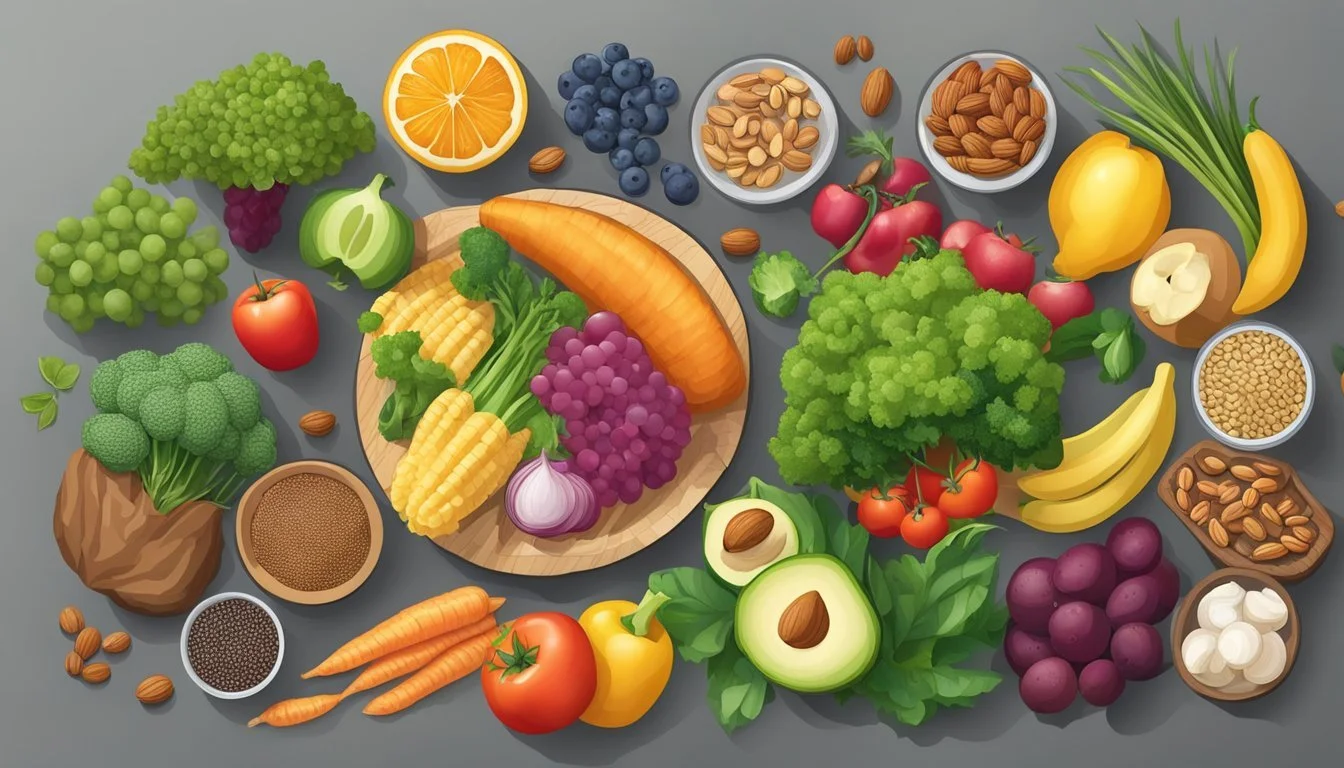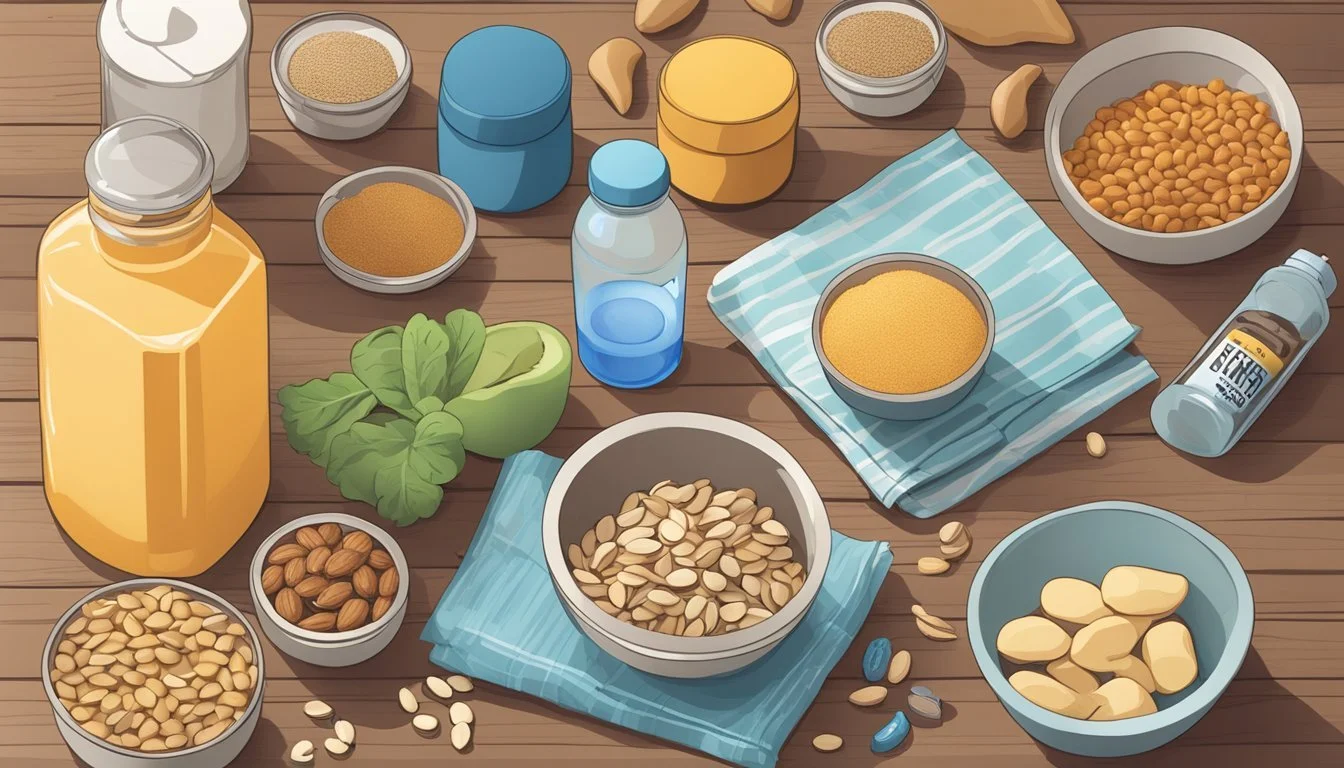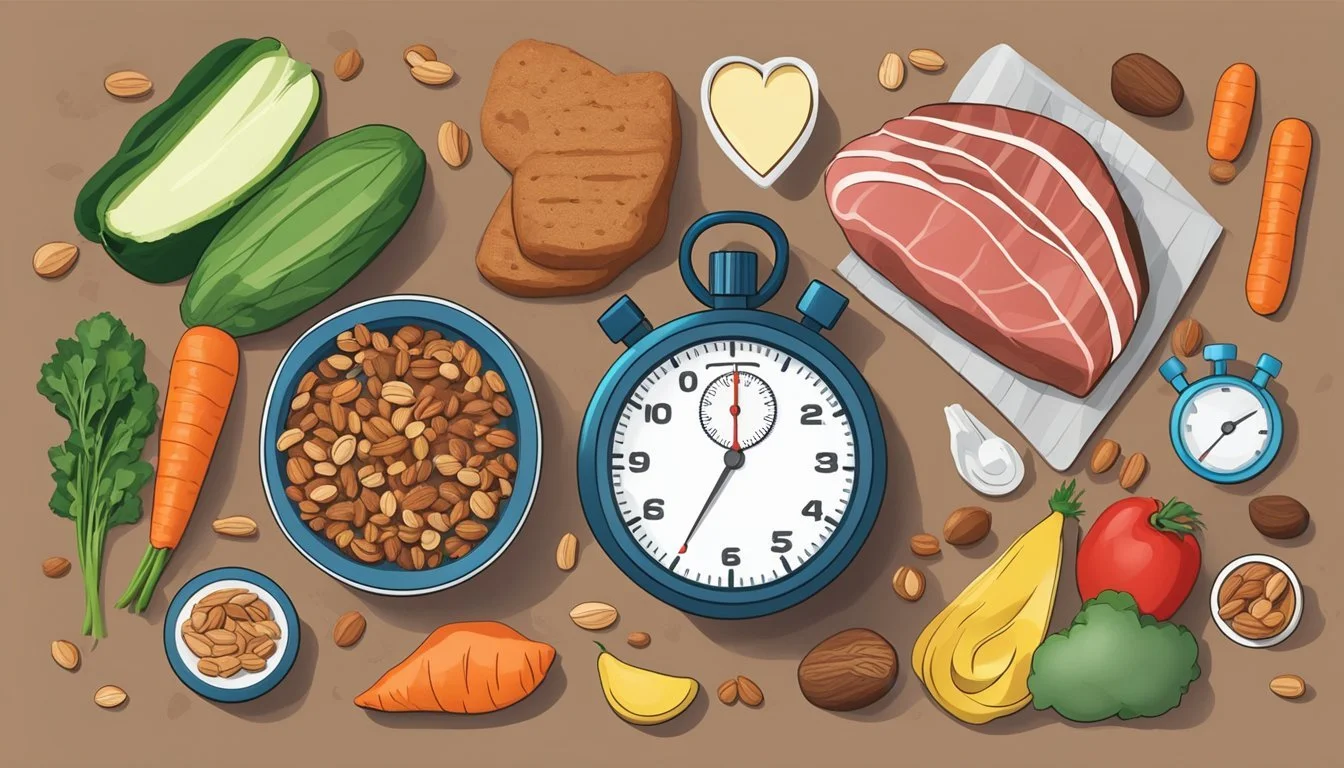How to Create a Grain-Free Meal Plan for Endurance Athletes
Optimizing Performance without Gluten
Endurance athletes often face unique nutritional challenges, as their bodies require efficient fuel to sustain prolonged periods of physical activity. Adopting a grain-free meal plan can offer alternative energy sources that align with specific health goals and dietary preferences. This approach to nutrition focuses on eliminating grains in favor of other carbohydrate sources, proteins, and fats that are pivotal in supporting long-duration sports and activities.
When constructing a grain-free meal plan, it's essential to select a variety of nutrient-dense foods that can provide consistent energy and aid in recovery. Athletes can capitalize on vegetables, fruits, nuts, seeds, legumes, and quality meats and fish, to ensure they receive a balanced intake of macronutrients. Careful consideration of vitamin and mineral intake is also important, as these play a vital role in overall health and athletic performance.
While grains are commonly viewed as a staple in an athlete's diet, especially for their carbohydrate content, grain-free options can be equally effective. They may help in managing inflammation and digestive issues that some athletes experience with grain consumption. By mindfully incorporating a wide range of whole foods, endurance athletes can meet their elevated nutritional needs and maintain peak performance without relying on traditional grain-based meals.
Crafting a grain-free meal plan tailored for endurance athletes involves incorporating an array of grain-free nutrient-dense foods to support optimal performance and recovery. By harnessing the grain-free nutritional impact of lean proteins, healthy fats, and an abundance of fruits and vegetables, athletes can fuel their training and competitions effectively.
For endurance athletes focused on grain-free muscle building, prioritizing nutrient-dense options can provide essential support for strength and recovery. Additionally, ensuring the inclusion of grain-free fiber from sources such as fruits, vegetables, and seeds can contribute to digestive health and sustained energy.
Individuals experiencing grain-free weight loss plateaus can benefit from a well-crafted grain-free meal plan, offering a fresh approach to support their wellness journey. Moreover, preparing grain-free condiments dressings can enhance the flavor and nutritional value of meals without compromising dietary choices.
Considering the challenges of grain-free traveling, a well-thought-out meal plan can provide endurance athletes with convenient and nourishing options to maintain their dietary regimen while on the go. By curating a meal plan that prioritizes nutrient-dense and wholesome foods, endurance athletes can optimize their performance and overall well-being.
Understanding the Grain-Free Diet
A grain-free meal plan excludes all grains and products made from them. This diet is considered for its potential impact on health and performance, particularly for endurance athletes who demand sustained energy and reduced inflammation.
Benefits of Grain-Free for Athletes
Nutrient Absorption: Eliminating grains may improve nutrient absorption. Grains can contain anti-nutrients like phytates, which can bind minerals and reduce their bioavailability. By focusing on nutrient-dense foods, athletes may experience better mineral uptake essential for performance.
Reduced Inflammation: Some athletes opt for a grain-free diet to minimize inflammation. Grains can cause inflammation in certain individuals, potentially leading to discomfort and delayed recovery.
Performance Enhancement: A grain-free diet can lead to adaptations in energy utilization. Athletes may become more efficient at burning fats for energy, providing a steady energy supply for endurance activities.
Potential Challenges and Misconceptions
Energy Supply: Grains are a major source of carbohydrates, crucial for endurance athletes. It's a challenge to ensure an adequate intake of carbohydrates for energy without grains. Athletes must find alternative carbohydrate sources to maintain intense training requirements.
Nutrient Diversity: A grain-free diet might lead to a restricted intake of certain nutrients. Grains are fortified with vitamins and minerals. Without grains, careful planning is necessary to prevent nutrient deficiencies.
Misconceptions: There’s a misconception that all grains cause inflammation and that a grain-free diet is healthier for everyone. However, only some individuals may have sensitivities or intolerances to grains, and many can consume them without adverse effects on health or performance.
Essential Nutrients and Alternatives to Grains
Endurance athletes require a well-balanced intake of essential nutrients to perform at their best, especially when following a grain-free diet. Carefully selected alternatives can provide the needed energy and nutritional balance.
Key Nutrients in a Grain-Free Diet
In a grain-free diet, it is crucial to maintain a sufficient intake of protein, fats, and nutrients to sustain energy levels and support muscle repair:
Protein: An essential building block for muscle repair, protein can be sourced from animal products like meat, fish, eggs, and dairy. Plant-based options include legumes, such as lentils and chickpeas, as well as tofu and tempeh (What wine goes well with tempeh?).
Fats: Healthy fats are important for energy and the absorption of fat-soluble vitamins. Avocado, olive oil, nuts like almonds and walnuts, and seeds like chia and flax provide high-quality fats.
Nutrition: A rich array of vitamins and minerals can be obtained from a colorful variety of fruits and vegetables. Dark leafy greens, berries, and other brightly-hued produce offer antioxidants, while sweet potatoes and beets can supply complex carbohydrates.
Grain Alternatives for Endurance Athletes
Grain-free diets can include several nutritious alternatives to traditional grains, helping provide the energy required for endurance activities:
Pseudocereals: Grains like quinoa, amaranth, and buckwheat are not true grains but offer similar benefits. They are complete sources of plant-based protein and are rich in essential amino acids.
Pseudocereal Protein (g) per cup cooked Notable Nutrients Quinoa 8 Iron, magnesium, fiber Amaranth 9 Iron, calcium, magnesium, fiber Buckwheat 6 High-quality protein, B vitamins
Nuts and Seeds: These are excellent sources of energy, protein, and healthy fats. They can be added to meals or eaten as snacks.
Nut/Seed Benefits Almonds High in vitamin E, magnesium, and protein Chia Seeds Rich in omega-3 fatty acids and fiber
Vegetables and Fruits: Beyond essential micronutrients, they also provide natural sugars and fibers for sustained energy.
Vegetable/Fruit Benefits Kale Vitamins A, C, K, iron, and antioxidants Bananas Potassium, vitamin C, and quick energy
These alternatives not only enrich the diet with needed nutrients but also add variety and flavor to an athlete's meal plan.
Meal Planning and Preparation
Creating a grain-free meal plan for endurance athletes requires a focus on a balance of macronutrients and strategic preparation to maximize nutritional benefit and convenience.
Creating a Balanced Meal Plan
For endurance athletes following a grain-free diet, it's essential to construct a meal plan that is rich in proteins, healthy fats, and nutrient-dense foods to support prolonged physical activity. Athletes should prioritize:
Proteins: Options like eggs, dairy products (such as Greek yogurt and cottage cheese (how long does cottage cheese last?)), and lean red meats.
Healthy Fats: Include items like avocados, nuts, and seeds to provide sustained energy.
Nutrient-Dense Foods: A variety of fruits and vegetables should be present to supply necessary vitamins and minerals for recovery and performance.
A weekly meal plan could look as follows:
Day Breakfast Lunch (What wine goes well with lunch?) Dinner Monday Scrambled eggs with spinach and avocado Grilled chicken salad Beef stir-fry with assorted vegetables Tuesday Greek yogurt with nuts and berries Turkey meatballs with zucchini Grilled salmon with asparagus (how long does asparagus last?) Wednesday Cottage cheese with sliced peaches Tuna salad stuffed bell peppers (What wine goes well with stuffed bell peppers?) Sheet pan shrimp with broccoli
This table serves as a guide and can be adjusted based on the athlete's specific caloric and nutritional needs.
Preparation Tips and Cooking Techniques
For efficient meal preparation, athletes can employ techniques to minimize time spent in the kitchen while maximizing nutritional value:
Batch Cooking: Cook larger portions of proteins like chicken or beef to be used in various meals throughout the week.
One-Pot Meals: Employing one-pot or sheet pan methods reduces clean-up and can provide multiple servings of a balanced meal. For instance, a sheet pan of roasted chicken (What wine goes well with roasted chicken?) thighs, brussels sprouts, and sweet potatoes can supply a few days' worth of dinners.
Scheduling Prep Time: Dedicating a specific time slot for meal prep, such as Sunday afternoon, can establish a routine, making it more likely that the meal plan is adhered to.
By using these strategies, athletes can ensure they have convenient access to healthy, grain-free meals that support their training regimen.
Sample Grain-Free Meals and Recipes
Endurance athletes can maintain high energy levels and improved performance with meals that are rich in proteins, healthy fats, and seeds. Here, we offer specific recipe ideas for breakfast, lunch, and dinner that align with a grain-free diet plan.
Breakfast Ideas for Maximum Energy
Eggs and Avocado: Scrambled eggs with slices of avocado provide a protein-rich start to the day, offering essential fatty acids and high-quality protein.
Nut and Seed Porridge: A hot bowl of porridge made from mixed nuts and seeds, such as almonds, chia seeds, and flaxseeds. This can be combined with a non-dairy milk such as almond or coconut milk, and topped with fresh berries for a sweet, energizing start.
Lunch Options for Sustained Performance
Mixed Greens with Grilled Chicken: A salad made from a variety of leafy greens, tossed with grilled chicken strips, and garnished with a sprinkle of nuts for added texture and nutrients.
Tempeh and Vegetable Stir-fry (What Wine Pairs Perfectly With Vegetable Stir-Fry?): Soy-based tempeh stir-fried with broccoli, bell peppers, and other preferred vegetables in olive oil, garnished with sesame seeds, for a high-protein, flavorful lunch option.
Dinner Recipes for Optimal Recovery
Grilled Salmon (What wine goes well with grilled salmon?) with Asparagus: A fillet of salmon, rich in omega-3 fatty acids, grilled and served alongside steamed asparagus for their anti-inflammatory properties.
Butternut Squash Noodles: Spiralized butternut squash sautéed with garlic, olive oil, and a mix of Mediterranean herbs, topped with a lean protein such as diced chicken or turkey, offering a comforting and restorative dinner.
These meal suggestions can be alternated or combined, and they offer room for personal customization to suit individual dietary preferences and nutritional needs.
Snacks and Supplements
In forming a grain-free meal plan for endurance athletes, the inclusion of nutrient-dense snacks and the strategic use of supplements can bridge nutritional gaps and sustain energy levels.
Nutrient-Dense Snacks for Athletes
Endurance athletes can benefit from snacks that are rich in proteins and healthy fats while being grain-free. Some examples include:
Protein bars: Look for bars made with hemp protein, which is a grain-free option that also provides essential amino acids.
Seeds and Nuts: Mixtures of almonds, walnuts, chia seeds, and flax seeds can offer a good balance of omega-3 fatty acids and protein.
A quick snack option:
Greek yogurt topped with a mix of chia and flax seeds for a protein and omega-3 boost.
Understanding Supplements and Protein Powders
While a healthy diet should always come first, supplements and protein powders can play a role in an athlete's nutrition plan, especially when grain-free options are necessary.
Protein Powder: Whey protein, although dairy, may be considered grain-free; however, plant-based options like pea or hemp protein are alternatives for those looking for completely plant-derived supplements.
Omega-3 Supplements: For athletes not consuming fish, an omega-3 supplement can be crucial to maintaining a balanced diet.
In summary, endurance athletes following a grain-free diet should consider incorporating a range of high-protein snacks and may benefit from supplements such as protein powders and omega-3s to support their performance and recovery.
Hydration and Electrolytes
Proper hydration and electrolyte balance are essential for endurance athletes to maintain peak performance and promote recovery. This section examines the pivotal role of hydration and how to choose the right fluids and electrolytes to keep the body functioning optimally.
The Role of Hydration in Endurance Sports
For endurance athletes, hydration is crucial as it impacts every system in the body, from circulatory to thermoregulatory processes. Adequate water intake helps to prevent dehydration, which can lead to reduced performance, overheating, and even heatstroke. Athletes should drink fluids regularly before, during, and after exercise to maintain hydration levels. Guidelines suggest:
Before Exercise: Consume about 10-20 ounces of water, 2 to 4 hours in advance.
During Exercise: Aim to drink every 15-20 minutes, adjusting based on sweat rate, humidity, and temperature.
After Exercise: Replace any fluid lost, ideally by drinking 16-24 ounces of water for every pound lost through sweat.
Choosing the Right Fluids and Electrolytes
Endurance athletes must not only focus on water intake but also ensure they are replenishing electrolytes like sodium, potassium, magnesium, and calcium, which are lost through sweat. Electrolytes facilitate critical bodily functions, including muscle contractions and nerve signaling. Fluid choices can include:
Plain Water: The most accessible and effective way to stay hydrated.
Electrolyte Solutions: Specialty sports drinks that replace lost salts and minerals are beneficial during prolonged activities.
Tea and Other Beverages: Non-caffeinated teas can be hydrating, but it's essential to avoid drinks that can lead to dehydration, such as those with caffeine or alcohol.
To create an individualized hydration strategy:
Monitor weight changes pre- and post-workout to estimate fluid losses.
Adjust fluid and electrolyte intake according to intensity, duration, and environmental conditions.
Consider personal sweat rate and sodium concentration when customizing electrolyte replacement needs.
Maintaining proper hydration and electrolyte balance can aid not only in endurance performance but also in the body's recovery process, ensuring athletes are ready for their next training session.
Adjusting the Grain-Free Diet for Training and Competition
Endurance athletes often manipulate their diets to optimize performance and recovery. A grain-free strategy requires careful planning to meet the body’s energy demands and sustain rigorous training cycles.
Tailoring the Diet to Training Cycles
Carbohydrate Intake: During high-volume training periods, athletes must compensate for the absence of grains with alternative sources of carbohydrates. It is essential that they:
Incorporate carbohydrate-rich, grain-free foods such as sweet potatoes, fruit, and root vegetables.
Increase overall caloric intake, ensuring that carbohydrates account for approximately 45-65% of their daily calories, as recommended by dietary guidelines for endurance training.
Macronutrient Balance: Adjusting the proportion of macronutrients to sync with current training loads will support both performance and recovery. Runners should:
Evaluate and adjust fat and protein intake; with more fat as a dense energy source, and ample protein for muscle repair.
Use a meal schedule that aligns their most carbohydrate-dense meals with post-training recovery windows to optimize glycogen replenishment.
Nutrition Strategies for Race Day
Pre-Race Meal: A well-planned pre-race meal is crucial to prevent the stress of dietary discomfort. Runners should consider:
Consuming a familiar, easily digestible, carbohydrate-rich meal 3-4 hours before the event.
Aiming for a meal that contributes to the necessary calorie count without grain-based options, possibly including foods like bananas blended in a smoothie for quick energy.
During the Race: Maintaining energy throughout the race demands foresight in nutrition choices, such as:
Preparing portable, grain-free carbohydrate sources like energy gels or chews.
Planning caloric intake, focusing on smaller, frequent quantities to maintain blood sugar levels and delay fatigue.
By adhering to these strategies, endurance athletes can maintain a grain-free diet without compromising on their energy needs during training and competitions. Properly managed, such adjustments ensure sustained performance and efficient recovery.
Monitoring Health and Performance
A grain-free diet for endurance athletes should focus on both maintaining optimal health and enhancing performance. This involves carefully tracking nutrition, assessing impacts on performance, and seeking professional advice when necessary.
Tracking Nutritional Intake
It's essential for athletes to track their intake of nutrient-dense foods to ensure they are meeting their energy needs without grains. Athletes need to focus on foods rich in vitamins, minerals, and antioxidants to support their metabolism and overall health. A daily record should include:
Protein: Aim for 1.2-2.0 g/kg/day, as it's necessary for muscle repair.
Fats: Include sources high in omega-3s for energy and to support heart health.
Micronutrients: Track intake of iron, B12, vitamin D, and antioxidants for optimal function.
Cholesterol: Monitor levels regularly to ensure dietary fat is not contributing to health issues.
Assessing the Impact on Performance
Regular assessment of athletic performance can help indicate whether the grain-free diet provides sufficient energy. Key performance indicators to monitor include:
Endurance levels: Do they remain constant or improve?
Recovery times: Are athletes recovering at an expected rate post-exercise?
Metabolic efficiency: How effectively is the body using fats for fuel?
When to Consult a Nutritionist
Athletes should consult with a nutritionist if they notice:
Unintended weight changes.
Persistent fatigue, indicating possible nutritional deficiencies.
Performance declines, which can signal inadequate calorie or nutrient intake.
A nutritionist can provide a tailored meal plan ensuring intake of key nutrients such as B12, which can be scarce in grain-free diets, and work on incorporating a broad range of fat sources for energy metabolism, while balancing cholesterol.
Resources and Further Reading
For athletes seeking guidance on sports nutrition that aligns with a grain-free diet, a myriad of resources are available to craft nutritious and performance-enhancing meal plans. It is imperative for athletes, particularly those engaged in endurance sports, to integrate nutrient-dense food into their regular dietary routine.
Books and Guides:
Grain Free Meal Plan | Bob's Red Mill: A comprehensive guide supporting the development of meal plans sans grain, inclusive of a grocery list and suggestions for scheduling meals.
The Ultimate Seven-Day Meal Plan for Endurance Athletes: Offers meal suggestions such as ginger chicken stir-fry which are tailored to the needs of endurance athletes while adhering to a grain-free protocol.
Runner's Diet: The Complete Guide to Eating for Endurance - RunToTheFinish: This guide underscores the importance of balancing macronutrients and ensuring sufficient inclusion of fruits and vegetables in an athlete's diet.
Online Resources:
Nutrium Blog provides ideas for gluten-free and whole food-based meals, suitable for pre-workout and recovery times.
A Grain-Free Diet Plan that promises a 7-day meal plan optimized for those looking to eliminate grains from their diet. It provides recipes and a grocery list to assist in meal prep.
When devising a nutrition plan, athletes must consider a balanced intake of carbohydrates, proteins, and fats. Establishing a healthy diet that is gluten-free yet rich in all essential nutrients could be pivotal in achieving sports performance goals. It's also crucial for endurance athletes to include a variety of foods to aid bodily function and recovery post-exercise.
For additional support, athletes may consider consulting a registered dietitian specialized in sports nutrition to ensure their meal plans are personalized to their specific dietary needs and performance goals.









